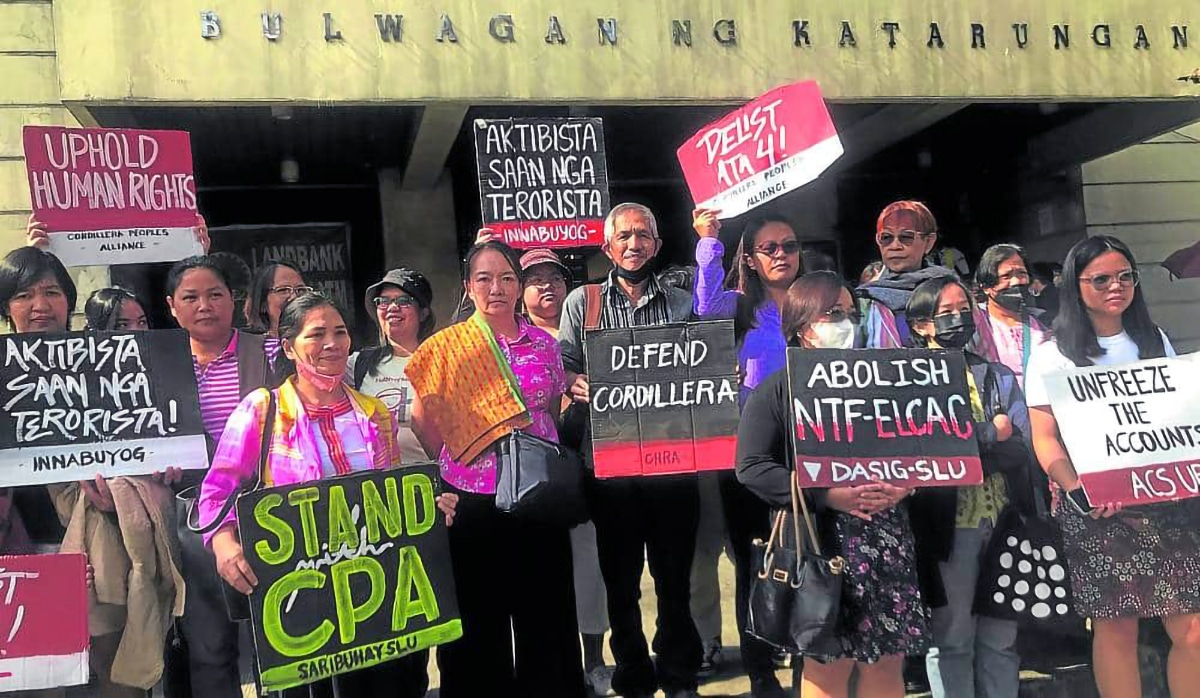
PROTECTION The Baguio City council is drafting an ordinance to protect local activists who have been harassed and Red-tagged by the military, police and other groups. Baguio is among the areas in the country where activists advocating for the rights of indigenous peoples, women, workers and students are part of the community. —Vincent Cabreza
BAGUIO CITY, Philippines — Only the state, counting workers under government employment such as soldiers and policemen, is liable for human rights violations as “correctly” asserted in a draft law protecting Baguio activists and other “human rights defenders,” according to the Commission on Human Rights (CHR).
During the city council session on Monday, lawyer Romel Daguimol, CHR Cordillera director, said the Philippine government is a signatory to the Universal Declaration of Human Rights and is accountable for “state actors” who do not heed these rights.
He countered arguments raised by the military and the police that a local ordinance shielding activists from attacks should also protect them when they are vilified by civilians.
READ: Military opposes Baguio haven for rights activists
Proposed Ordinance No. 0026-23, or the draft Baguio human rights defenders law, makes Red-tagging a serious offense here.
It sanctions and imposes fines against law enforcers and state employees who commit “political vilification, Red-tagging … and the false, unfounded and derogatory labeling of human rights defenders.”
The ordinance defines offenders as “any government personnel or unit, military affiliate, paramilitary, police or military asset, any agent of the state or an individual acting on its behalf.”
It also lists “any individual acting in their private capacity, private corporations and nonstate armed groups” as human rights violators, according to the measure sponsored by Councilors Peter Fianza, Jose Molintas, Fred Bagbagen and Arthur Allad-iw.
“Normally, when you say human rights violations, they are committed by the state. All signatories [to the human rights declaration set by the United Nations after World War II] have the obligation to protect these rights,” Daguimol told the council.
‘Mutual respect’
The draft ordinance is due for third reading but its passage was delayed when Councilor Betty Lourdes Tabanda, also a lawyer, asked if police officers and government officials also deserve protection under the human rights defenders measure.
Stressing she was not against the draft law, Tabanda said she raised the issue “to level the playing field,” as well as secure a commitment from activists that they practice “mutual respect.”
“When a private individual chants ‘fascists’ or ‘tyrants’ when referring to the police or government officials, what is their recourse if they do not get the same protection under the Human Rights Defenders Act?” she asked.
“That is precisely what this ordinance intends to do—level the playing field for activists” when confronted by Red-tagging government employees, policemen and soldiers who are armed with guns and other state resources, countered Molintas.
Apart from penalties like fines of up to P5,000, the proposed law also offers legal and financial aid, such as small remunerations, to activists who were illegally detained.
Lawyer Jerico Gay-ya, dean of the Saint Louis University School of Law, who represented the Baguio academic community at the Monday session, said the rights of public officials are already protected by a “well-entrenched mechanism” of laws.
History of suppression
Last year, in a July 4 writ of amparo granted to Bayan Muna vice president for the Visayas Siegfred Deduro, the Supreme Court ruled that Red-tagging “constitutes threats to an individual’s life, liberty and security … [because] being associated with communists or terrorists makes the Red-tagged person a target of vigilantes, paramilitary groups or even state agents.”
Senior Associate Justice Marvic Leonen, in a concurring opinion, pointed out that Red-tagging “is our version of McCarthyism,” a reference to American Senator Joseph McCarthy, who led an anti-subversion campaign in 1954.
“Our own history is an example of when the premise of suppressing the alleged terrors of communism led to decades of exploiting power for oppression and death,” Leonen said, adding: “History records the many human rights violations that may have been caused by this unsophisticated view of some in the echelons of military power.”